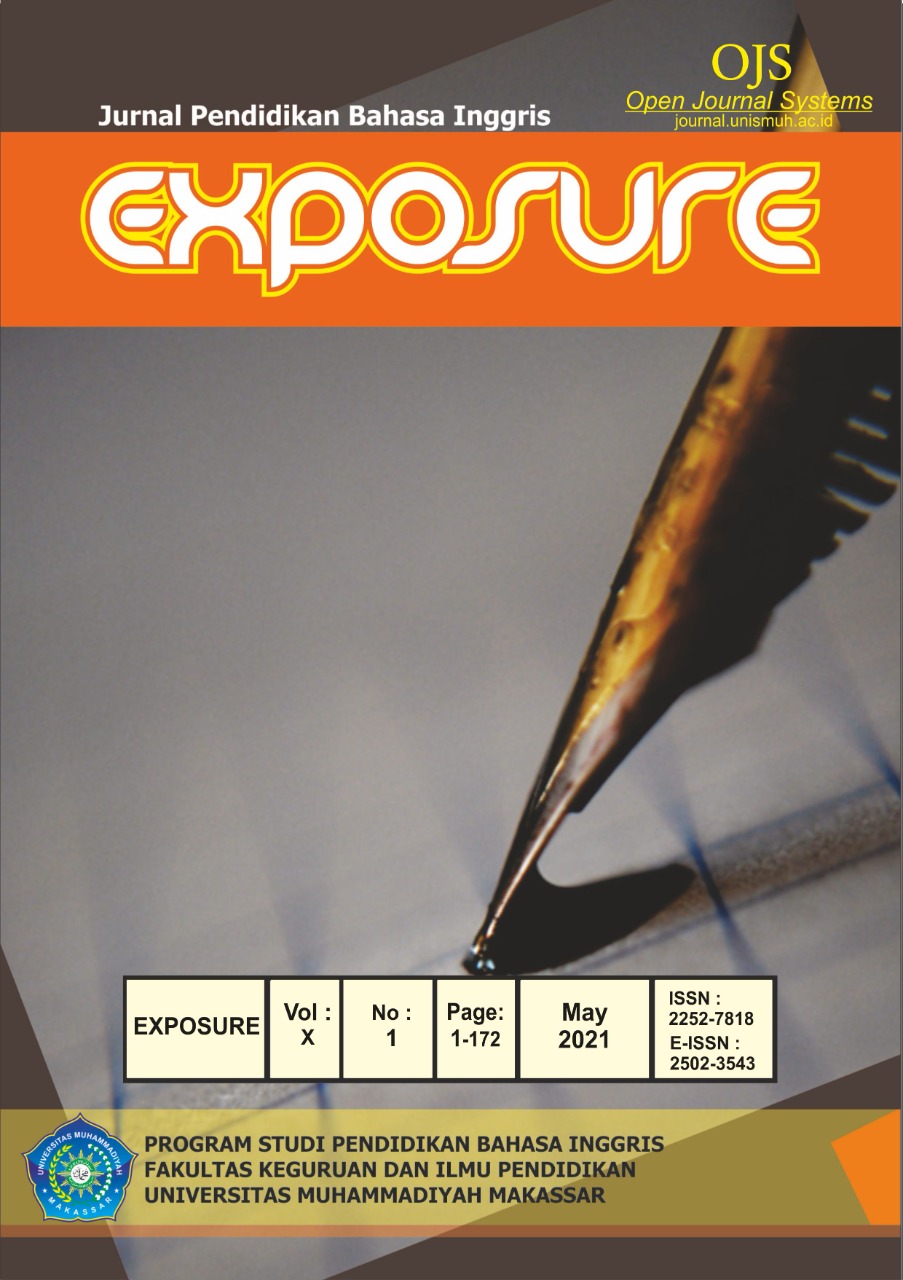LINGBEE AS INTEREST DRIVEN IN BRAINSTORMING SPEAKING CLASS
DOI:
https://doi.org/10.26618/exposure.v10i1.5172Keywords:
Speaking Skill, Lingbe, Brainstorming And Students’ Interest.Abstract
This Research Aims to Measure the Students’ Interest in Brainstorming Speaking Class by Using Lingbe. The Researcher Used Lingbe as The Students’ Interest Driven In Brainstorming Speaking Class. The Researcher Involves Technology in Interactive Learning. In This Case the Researcher Offers an Interactive Application Called Lingbe.A Pre-Experimental Method Was Conducted by The Researcher in This Study. The Population Was The Xii Grade Students Of Mipa Of Sman 2 Barru. Due To This Semester Consisted Six Intact Class (228 Students), The Researcher Used The Cluster Sampling Method In Deciding The Research Sample. The Instruments That Were Used In Collecting The Data Were An Informal Likert’s Scale Questionnaire And Analysed By Using Spss Application.The Results Of The Research Showed That The Students Stated Interested In Learning English Using Lingbe Assisted By Brainstorming In Their Speaking Class. The Mean Score Of Students’ Interests Was 54.85 And Considered As Moderately Interested.
References
Byrne, D. (1988). Longman Handbook For Language Teachers. In Teaching Writing Skills (NewEdition).
Mackey, A. & S. M. Gass (2015). Second language research: Methodology and design. New York: Routledge
Nunan, D. (2003). The Impact of English as a Global Language on Educational Policies and Practices in the Asia-Pacific Region. TESOL
Quarterly, 37(4), 589. https://doi.org/10.2307/3588214
Sugiyono. 2008. Qualitative and Quantitative Research Methods R & D. Bandung: ALFABETA
Taghilou, S. (2019). the Effect of Classroom Interaction on Developing the Learner’s Speaking. In Journal. University of Mohaghegh Ardabili.
Virginia Evans. (2000). Successful Writing Proviciency (NewEdition). Express Publishing.
Downloads
Additional Files
Published
Issue
Section
License
Authors who publish with this journal agree to the following terms:
In order to assure the highest standards for published articles, a peer review policy is applied. In pursue of the compliance with academic standards, all parties involved in the publishing process (the authors, the editors and the editorial board and the reviewers) agree to meet the responsibilities stated below in accordance to the Journal publication ethics and malpractice statement.
Duties of Authors:
- The author(s) warrant that the submitted article is an original work, which has not been previously published, and that they have obtained an agreement from any co-author(s) prior to the manuscript’s submission;
- The author(s) should not submit articles describing essentially the same research to more than one journal;
- The authors(s) make certain that the manuscript meets the terms of the Manuscript Submission Guideline regarding appropriate academic citation and that no copyright infringement occurs;
- The authors(s) should inform the editors about any conflict of interests and report any errors they subsequently, discover in their manuscript.
Duties of Editors and the Editorial Board:
- The editors, together with the editorial board, are responsible for deciding upon the publication or rejection of the submitted manuscripts based only on their originality, significance, and relevance to the domains of the journal;
- The editors evaluate the manuscripts compliance with academic criteria, the domains of the journal and the guidelines;
- The editors must at all times respect the confidentiality of any information pertaining to the submitted manuscripts;
- The editors assign the review of each manuscript to two reviewers chosen according to their domains of expertise. The editors must take into account any conflict of interest reported by the authors and the reviewers.
- The editors must ensure that the comments and recommendations of the reviewers are sent to the author(s) in due time and that the manuscripts are returned to the editors, who take the final decision to publish them or not.
Authors are permitted and encouraged to post online a pre-publication manuscript (but not the Publisher’s final formatted PDF version of the Work) in institutional repositories or on their Websites prior to and during the submission process, as it can lead to productive exchanges, as well as earlier and greater citation of published work (see The Effect of Open Access). Any such posting made before acceptance and publication of the Work shall be updated upon publication to include a reference to the Publisher-assigned DOI (Digital Object Identifier) and a link to the online abstract for the final published Work in the Journal.

